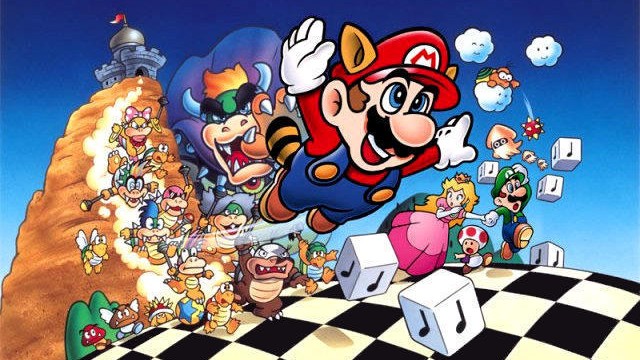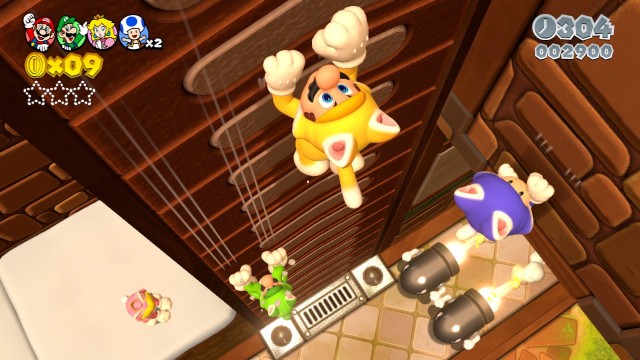
State of the Art is about more than the latest in gaming technology or waxing poetic about our beloved art form. It is all of this and more. Gaming has ingrained itself in our world and intertwined itself into so many aspects of culture, from the deeply personal to the broadly social, and I hope to touch upon these factors so that we might have a more thoughtful discussion on how video games impact themselves, you, and the world at large. Considering this week’s overall theme, I think it is best that we also start at the beginning.
Think back to your earliest days as a gamer, and then ponder how those games you played have impacted your perception of video games. I imagine many out there are like me, and had a youth that was really defined by Nintendo, particularly the NES and SNES. While Super Mario World for SNES was the first game I truly invested a great deal of time in, I have many older memories of playing an NES at a babysitter’s house with Super Mario Bros. 3 and the The Legend of Zelda easily being the most prevalent games. Ultimately, though, it was the old Mario games that I feel defined video games for me, and that has impacted how I view games to this very day.
For me, thoughts of gaming filled my head with images of colorful worlds and characters telling nonsensical, barely present stories through tight and challenging gameplay. Of course, I would play other games that would impact my perception, but Nintendo games always felt natural to me because they constructed the foundation for life as a gamer. While each Nintendo franchise embraces unique looks, sounds, and game mechanics, everything remains rooted in the same basic philosophies to this very day. I can’t help but imagine that many of my colleagues and readers feel the same way.
But this raises another question: what about the people who are taking up gaming now or will be picking up controllers in the near future? While Nintendo still remains relevant for millions of gamers and continues to draw new audiences, the simple truth is that the zeitgeist of gaming has shifted dramatically in the last twenty years. Plenty of gamers will learn the ropes with Pokémon, but many more are more likely to get started with Call of Duty, Minecraft, League of Legends, Angry Birds, or any other of the numerous major franchises that dominate sales charts and are cultural forces in their own right. I’m not trying to argue these games are unworthy or bad, but they are different and I’m curious to know how these gamers will view gaming as a result of starting out with a different frame of reference.
 This certainly would explain why people half my age would describe this scene as too “kiddie.”
This certainly would explain why people half my age would describe this scene as too “kiddie.”To put these in perspective, let’s look at Nintendo gamers again. While many fans of Nintendo have expanded their horizons to include other developers, franchises, and platforms, plenty of folks remain dedicated, die-hard fans. Some might write them off as being blinded by nostalgia, but I would argue that they remain so loyal to Nintendo because most modern games stand in stark contrast to the fundamental cornerstones of the Nintendo experience. Mainstream AAA development is overwhelmingly dominated by aspirations to create photo-realistic experiences with dramatic stories and broad gameplay ideas intentionally designed to appeal to wide audiences. One might avoid these sorts of games not out of disdain, but rather due to the simple fact that they fail to meet the perceptions of what video games should be based on past experience.
Now, let’s flip this around and try to imagine the perspective on a gamer raised without the Nintendo influence. A child raised on competitive modern shooters like Call of Duty is likely to have a unique perspective on gaming, as is a child who is deeply invested in the open-ended and customizable gameplay of Minecraft. Give either of these gamers a linear, 2D side-scrolling platformer about riding cartoon dinosaurs while jumping on turtles and one can easily see how there could be significant disconnect. A less aware gamer might simply write off Mario as a lesser or inferior game, but the core issue here is the simple fact that many Nintendo games are simply speaking a language they are unfamiliar with due to a drastically different frame of reference.
While this argument might seem to suggest that Nintendo is no longer relevant and thus adding to the doom and gloom surrounding Nintendo, I would argue that there is plenty of reason to be hopeful. First and foremost, gamers’ perspectives change as they encounter and embrace new ideas, eventually learning that their narrow views and steadfast allegiances were ultimately pointless. Furthermore, one of the most influential forces in gaming right now is the indie scene, which is filled with ideas that are much more in line the groundwork Nintendo established decades ago. No doubt many of these developers started their gaming lives on NES and SNES like so many of us and are finally in a position where they revel in those influences with some hope of financial success.
While academics are free to continue the nature vs. nurture debate, I think most people of sound mind can accept that there are sociological and psychological factors from our upbringing that shape how we perceive and interact with the world. Gaming is not excluded from this process. What we play shapes, and ultimately limits our definition of what makes a video game, and these definitions can change on personal and cultural levels as the prevalence of certain trends ebb and flow or they can remain steadfast as we reject ideas that challenge the familiar. Ultimately, we wind up a product of our experiences and so do our tastes in video games.




 ShareThis
ShareThis







Also keep in mind even some of us have had to “reboot” our gaming. While I never had an NES as a child, I would play at friends’ houses on theirs, sometimes for hours. After moving to a new area, it took a while to make new friends, and so I switched primarily to PC gaming. Many top franchises right now began, or where dominate on the PC, even though I now play the latest episodes on consoles. They redefined my love for games and expanded my horizons. Otherwise, I may never have moved beyond our favorite plumber and his variety of career venues.
Quandaries like this article raises are what the industry needs more of. I always find the “nostalgia” thing laughable when people talk about Nintendo, because it usually comes from the same people who view Nintendo consoles as being for “kids”. Nintendo’s been chugging out incredible games and systems for like thirty years now; if kids are the “only” ones playing, how would nostalgia ever be a factor for them? In terms of longterm fans, while today’s releases are certainly derivative of previous games, they’re are also considerably evolved compared to the games of old, which makes nostalgia even tougher to sell. I think what it truly comes down to is that no other company has been as consistent as the big N, and that’s why its so beloved.